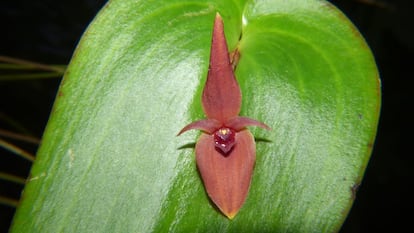The last orchid
A group of researchers in Colombia has discovered a new species of the flower that’s barely one centimeter in size.

This past Thursday, a group of researchers from Bogota’s Botanical Garden confirmed the discovery of a new species of orchid. They have named the flower Pleurothallis villahermosae after the municipality of Villahermosa, Tolima, where the plant was found. This new species of orchid—which measures barely one centimeter—is one of the more than 4,400 varieties that exist in Colombia. The South American country has the most orchids in the world, followed by Ecuador and Costa Rica. The orchid is Colombia’s national symbol.
After several expeditions to the forests of the Azufrado River basin, which is very close to the Nevado del Ruiz Volcano, three researchers discovered the new flower species. “The higher the altitude, the greater the diversity. However, the flowers are very difficult to see because they are very small and the forest is an extremely difficult environment to access,” says an expert.
“The newly identified species has the physical characteristics of enormous beauty and uniqueness, as the researchers’ photos show,” explains a Botanical Garden spokesperson. The plant’s morphological characteristics are currently being studied in the herbarium. “This finding is highly relevant given that we only know of one population of this species and a few individual flowers,” the spokesperson adds.

The researchers have recommended evaluating the flower’s conservation status. The low number of individual flowers observed could indicate threats to the species associated with factors such as deforestation and cattle-ranching. “This plant is going to be part of conservation programs because so few exist. By protecting this species, the entire forest will be protected,” says orchid expert Luis Fernando Pérez.
The Botanical Garden is a scientific research center whose mission is to collect plant material from all over Colombia. During one recent expedition to carry out that plan, researchers came across this new species of orchid.
Pérez explains that Colombia is currently undergoing a revolution in the research of this species. The 2016 signing of the peace accord between the government and the Revolutionary Armed Forces of Colombia (FARC) has made it possible to revisit and investigate many parts of the country. Previously, the armed conflict rendered many areas of Colombia off-limits to almost everyone. The future seems promising: “These plants have been populating the earth for millions of years; they arrived long before humans. There are still thousands of species to be discovered,” says Pérez. A study by the New York Botanical Garden confirms that the flowers have existed on Earth for over 90 million years.
The world has more species of orchids than of birds, mammals, amphibians and reptiles combined. Between 20,000 and 30,000 species form the planet’s largest family of vascular plants. However, the International Union for the Conservation of Nature (IUCN) has warned that 80% of the species of one genus of orchids—which are found across the northern hemisphere—faces the risk of extinction. Habitat destruction and flower-picking both endanger the orchids.
Tu suscripción se está usando en otro dispositivo
¿Quieres añadir otro usuario a tu suscripción?
Si continúas leyendo en este dispositivo, no se podrá leer en el otro.
FlechaTu suscripción se está usando en otro dispositivo y solo puedes acceder a EL PAÍS desde un dispositivo a la vez.
Si quieres compartir tu cuenta, cambia tu suscripción a la modalidad Premium, así podrás añadir otro usuario. Cada uno accederá con su propia cuenta de email, lo que os permitirá personalizar vuestra experiencia en EL PAÍS.
¿Tienes una suscripción de empresa? Accede aquí para contratar más cuentas.
En el caso de no saber quién está usando tu cuenta, te recomendamos cambiar tu contraseña aquí.
Si decides continuar compartiendo tu cuenta, este mensaje se mostrará en tu dispositivo y en el de la otra persona que está usando tu cuenta de forma indefinida, afectando a tu experiencia de lectura. Puedes consultar aquí los términos y condiciones de la suscripción digital.









































